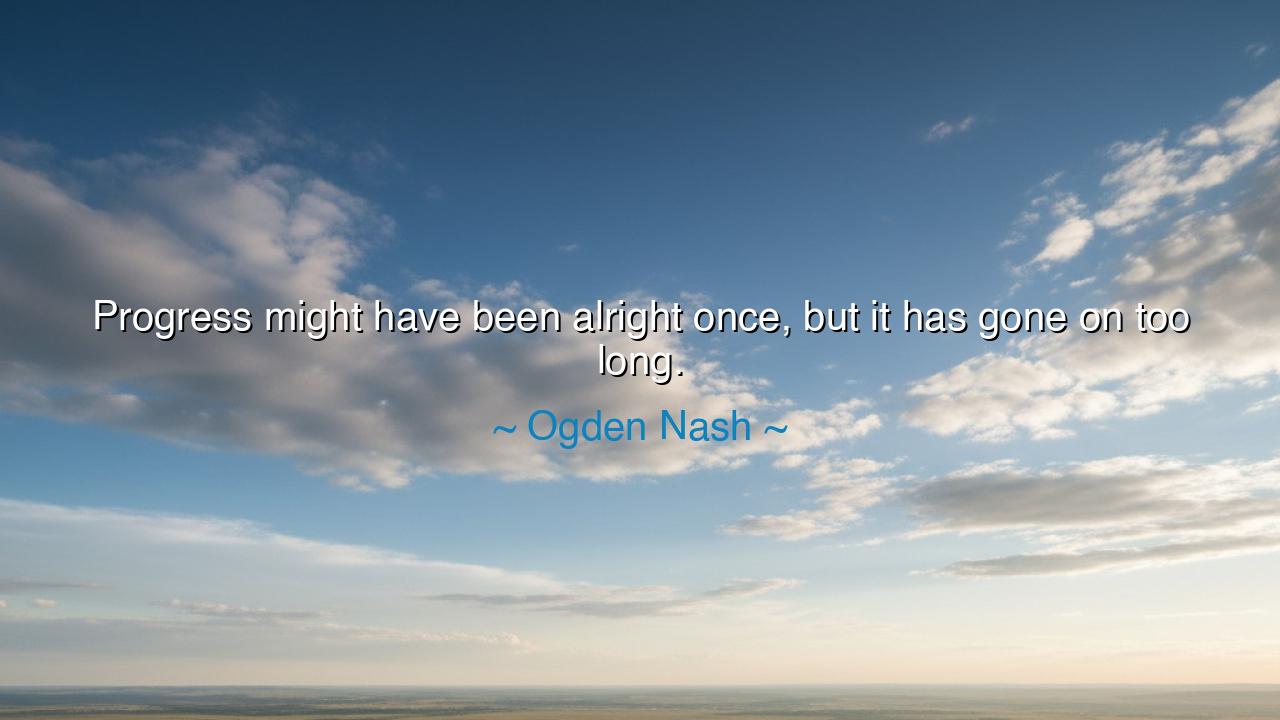
Progress might have been alright once, but it has gone on too






"Progress might have been alright once, but it has gone on too long." These words by the wit and satirist Ogden Nash are a provocative reflection on the nature of human advancement and the unintended consequences of continuous change. Nash, with his characteristic humor, encapsulates a deep and often unspoken truth: that while progress may have once been a force for good, when it is unchecked or carried to excess, it can become something that alienates us from the very things that make life rich and meaningful. It is a reminder that progress, in its pursuit of perfection, often leaves in its wake a loss of simplicity, authenticity, and balance.
The ancient Greeks were the first to explore the nature of progress in a structured sense. They believed in the importance of the pursuit of knowledge, of advancement, and of striving toward greater understanding. But they also warned against excess. Aristotle taught that virtue lies in balance—the golden mean—and that extremes could lead to ruin. Progress, in the Greek view, should be measured, thoughtful, and considerate of the human condition. This wisdom stands in stark contrast to the often unrelenting and unthinking nature of modern progress, which, as Nash suggests, has “gone on too long.”
Consider the rise of Rome, once a republic built on principles of order and justice, but whose own progress through conquest and expansion eventually led to its collapse. The Republic, with its checks and balances, gave way to the Empire, where unchecked power and a relentless desire for more land, wealth, and power caused the decline of the very virtues that once made Rome great. Progress, when driven by a hunger for power and expansion, led to internal corruption, excessive luxury, and a detachment from the core principles of its foundation. In its relentless pursuit of dominance, Rome’s progress became its undoing.
In the Industrial Revolution, we see another example of Nash's sentiment come to life. The age of machines brought great wealth, efficiency, and prosperity, but it also brought with it the harsh realities of urbanization, child labor, and environmental destruction. The relentless push for advancement, for more production and profit, left a deep scar on the environment and the very people who drove the industrial engines. Just as the ancient civilizations once feared, progress became blind to its consequences, pushing forward without regard for the balance of nature or the wellbeing of humanity.
Nash’s warning rings especially true in our modern world, where technology and innovation often advance without considering the long-term effects on society, culture, or even individual well-being. Smartphones, social media, and artificial intelligence have transformed our world in ways that were once unimaginable, but with these advancements come new challenges: the erosion of privacy, the mental health crisis, and the disconnection between people who are increasingly tethered to screens. As progress marches forward, we are often left behind, struggling to understand what it means to truly live in a world that prioritizes progress above all else.
The lesson here is clear: progress is not inherently bad, but it must be approached with wisdom and caution. We must not allow the pursuit of advancement to blind us to the values that truly matter—connection, simplicity, and balance. Just as the Greeks urged moderation, we must be mindful of where our progress is leading us. It is not enough to simply move forward; we must ensure that we are moving in the right direction, with purpose, and with a deep respect for the human condition.
Let us then take Ogden Nash’s words as both a caution and a challenge. As we continue our pursuit of progress in all aspects of life—be it through technology, society, or even personal development—we must ask ourselves: is this progress truly serving our greater good? Or are we, in our blind pursuit of advancement, losing sight of the very things that make life worth living? Let us be vigilant, let us strive for balance, and let us ensure that the progress we seek today is one that honors the lessons of the past and serves the needs of tomorrow.






AAdministratorAdministrator
Welcome, honored guests. Please leave a comment, we will respond soon